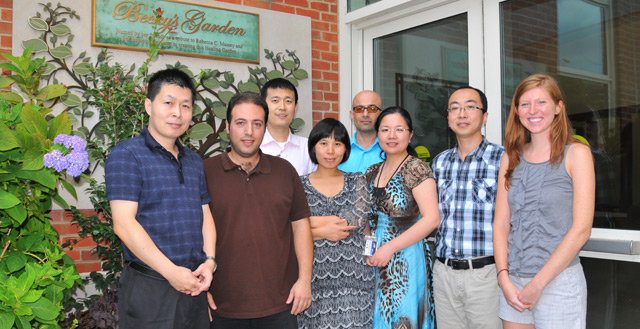Laboratory of Xiang-Yang (Shawn) Wang, Ph.D.

Research projects
The overall research focus of the lab is studying stress response and its key players (e.g., stress proteins or chaperone molecules), “danger”-sensing pattern recognition molecules (e.g., scavenger receptors) in inflammation, immunity and host response. In addition to elucidating their biological functions and mechanisms of their action, this group is also interested in developing novel therapeutic approaches for the treatment of cancer and other diseases.
- Molecular chaperoning and cancer immunotherapy
Large stress/heat shock proteins, called hsp110 and grp170, serve as molecular chaperones in numerous cellular processes that maintain protein homeostasis under both physiological and stress conditions. Based on their exceptional capacity in shuttling and cross-presenting exogenous antigens, researchers in Dr. Wang’s lab have developed and evaluated several chaperone-based immunotherapies, including a recombinant chaperone complex vaccine targeting defined tumor antigens. Ongoing studies are aimed to address the mechanisms of large stress protein-facilitated antigen recognition, processing, and presentation by specialized antigen-presenting cells, such as dendritic cells. In addition to protein antigen/substrate, large stress protein interactions with pathogen-associated molecules and resultant immune outcomes are under investigation. Current work in the laboratory also involves development of modified chaperone-based immune modulating agent to enhance vaccine potency or promote tumor response to other therapeutics.
- Scavenger receptors in host immunity and diseases
Scavenger receptors (SRs) act as stress “sensors” and recognize conserved patterns unique to microorganisms and self (e.g., modified macromolecules). Dr. Wang’s team made the first discovery that SRA/CD204, a prototype member of the SR family, attenuates therapeutically induced antitumor immunity. Researchers are investigating the mechanisms by which SRA/CD204 regulates an adaptive immune response and immune recognition of tumors using molecular, cellular and immunological approaches. Ongoing studies also aim to develop novel SRA/CD204-targeted approaches (molecular/immunologic/pharmacologic) to improve the efficacy of immunotherapy.
SRs function as pattern recognition receptors (PRRs) and are expressed primarily on myeloid cells (e.g., dendritic cell and macrophage) that are known to play crucial roles in regulation of an inflammatory response and tissue homeostasis. This group is interested in understanding the functions of these molecules under environmental, physiological, and pathological stress conditions, including heat shock, oxidative stress, radiation, viral infection, chronic inflammatory diseases, or autoimmune disorders.
-
Novel cancer therapeutic strategies engaging multiple antitumor mechanisms
Cancer is generally considered to be a highly heterogeneous disease. Multi-functional strategies are mandatory to overcome tumor resistance and to achieve improved antitumor efficacy. The researchers are testing rationally combined therapeutic approaches that can selectively target cancer cells for destruction and concurrently promote ”immunogenic“ cancer cell death to generate protective antitumor immunity. It would lead to more effective control of cancer metastases and prevention of tumor recurrence. Current research also includes understanding of tumor-induced immune tolerance or suppression mechanisms, immune cell-tumor interaction in the tumor microenvironment, as well as their potential impact on cancer treatments.
Laboratory members
Chunqing Guo, Ph.D.
Instructor
Xia Li, Ph.D.
Postdoctoral fellow
Wenjie Liu, Ph.D.
Postdoctoral fellow
Key publications
Zheng Y, Li X, Pagare PP, Yuan Y, Wang XY*, Zhang Y*. Design, synthesis, and characterization of rhein analogs as novel inhibitors of scavenger receptor A. Bioorganic & Medicinal Chemistry Letters 2017, 27(1): 72-76. PMCID: PMC5142634. * Corresponding authors
Akiel M, Guo C, Li X, Rajasekaran D, Mendoza RG, Robertson CL, Jariwala N, Yuan F, Subler MA, Windle J, Garcia DK, Lai Z, Chen HH7, Chen Y, Giashuddin S, Fisher PB, Wang XY, Sarkar D. IGFBP7 deletion promotes hepatocellular carcinoma. Cancer Research 2017, 77(15):4014-4025.
Guo C, Fulb JW, Jiang Y, Li X, Chojnackib, JE, Wu J, Wang XY,* Zhang S.* Development and characterization of a hydroxyl-sulfonamide analog, 5-chloro-N-[2-(4-hydroxysulfamoyl-phenyl)-ethyl]-2-methoxy-benzamide, as a novel NLRP3 inflammasome inhibitor for potential treatment of multiple sclerosis. ACS Chemical Neuroscience 2017 8(10):2194-2201. PMID: 28653829 * Corresponding authors
Pagare PP, Zaidi SA, Zhang X, Li X, Yu X, Wang XY, Zhang Y. Understanding molecular interactions between scavenger receptor A and its natural product inhibitors through molecular modeling studies. J Mol Graph Model. 2017, 77:189-199. PMCID: PMC5696021
Tang Y, Li H, Li Y, Liu Y, Zhou J, Zhou J, Lu X, Zhao W, Hou J, Wang XY, Chen Z, Zuo D. Macrophage scavenger receptor 1 contributes to pathogenesis of fulminant hepatitis via neutrophil mediated complement activation. Journal of Hepatology 2017. S0168-8278(17)32433-9
Guo C, Subjeck JR, Wang XY. Creation of recombinant chaperone vaccine using large heat shock protein for antigen-targeted cancer immunotherapy. Methods Mol Biol. 2018; 1709:345-357. doi: 10.1007/978-1-4939-7477-1_25. PubMed PMID: 29177671.
Emdad L, Das SK, Wang XY, Sarkar D, Fisher PB. Cancer Terminator Viruses (CTV): A Better Solution for Viral-Based Therapy of Cancer. J Cell Physiol. 2017 Dec 26. doi: 10.1002/jcp.26421. [Epub ahead of print]